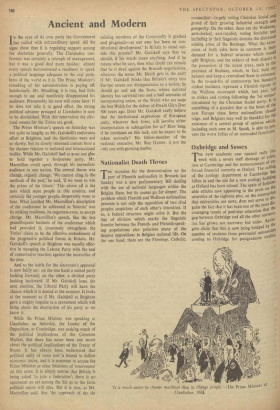Ancient and Modern
N the eyes of its own party the Government I has rallied with extraordinary speed. All the signs show that it is regaining support among the electorate generally. The Llandudno con- ference was certainly a triumph of management, but it was a good deal more besides: almost every speech demonstrated a readiness to speak a political language adequate to the real prob- lems of the world as it is. The Prime Minister's remaking of his administration is paying off handsomely. Mr. Maudling, it is true, had little enough to say and manifestly disappointed his audience. Presumably his turn will come later. If he does not take it to good effect, the strong political advance presaged at Llandudno is sure to be diminished. With this reservation the elec- toral omens for the Tories are good.
The Prime Minister's speech on Saturday was not quite so lengthy as Mr. Gaitskell's endurance effort at Brighton, and the histrionics were not so showy; but its closely reasoned content bore a far sharper relation to national and international reality. While Mr. Gaitskell had to pour out glue to hold together a fissiparous party, Mr. Macmillan could speak through his immediate audience to one nation. The central theme was change, organic change. 'We cannot cling to the methods of the past,' he said, 'if we want to win the prizes of the future.' This above all is the note which most people in this country, and certainly the younger people, desperately want to hear. What justified Mr. Macmillan's description of the conference he addressed as 'historic' was its striking readiness, its eagerness even, to accept change. Mr. Macmillan's speech, like the less grandiloquent business of the conference which had preceded it, immensely strengthens the Tories' claim to be the effective embodiment of the progressive political forces in Britain. Mr. Gaitskell's speech at Brighton was equally effec- tive in stamping the Labour Party with the seal of conservative reaction against the necessities of the time.
And so the battle for the electorate's approval is now fairly set : on the one hand a united party looking forward; on the other, a divided party looking backward. If Mr. Gaitskell loses the next election, the Liberal Party will have the chance which it is denied at the moment. It looks at the moment as if Mr. Gaitskell at Brighton gave a mighty impulse to a movement which will bring about the destruction of his party as we know it.
While the Prime Minister was speaking at Llandudno on Saturday, the Leader of the Opposition, at Cambridge, was making much of the political implications of the Common Market. But there has never been any secret about the political implications of the Treaty of Rome. It has always been understood that political unity of some sort is bound to follow economic union, and it is nonsense to accuse the Prime Minister or other Ministers of 'evasiveness' on this score. It is simply untrue that Britain is being asked 'to join a federation'; there is no agreement as yet among the Six as to the form political union will take. But it is true, as Mr. Macmillan said, that 'the approach of the six existing members of the Community is gradual and pragmatic—as our own has been on con- stitutional development.' Is Britain to stand out- side this process? Mr. Gaitskell says that we should, if his words mean anything. And if be means what he says, then what doubt can remain that he is dead against the Brussels negotiations, whatever the terms Mr. Heath gets in the end? If Mr. Gaitskell thinks that Britain's entry into Europe means our disappearance as a nation, he should go and ask the Scots, whose national identity has survived two and a half centuries of incorporating union, or the Welsh who are none the less Welsh for the defeat of Owain Glyn Dwr 500 years ago. Does Mr. Gaitskell really believe that the institutional expressions of European unity, whatever their form, will involve either incorporation or subjugation for us? How long, if he continues on this tack, can he expect to be taken seriously? His fellow-member of the national executive, Mr. Ray Gunter. is not the only one with growing doubts.














































 Previous page
Previous page